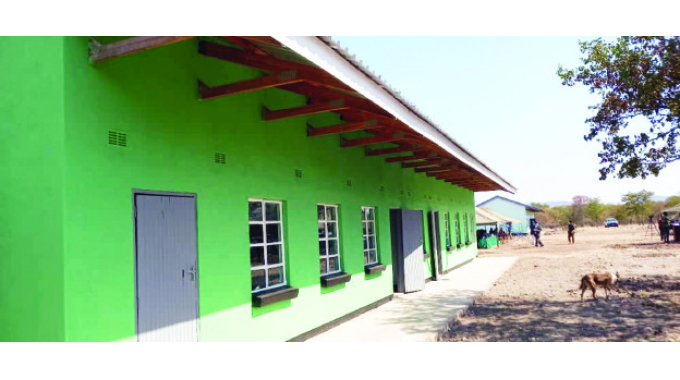EDITORIAL COMMENT : New term requires full commitment

SCHOOLS re-opened yesterday for the second term, as planned and as scheduled, with what amounts to the first fully normal term since the start of Covid-19 with all classes sitting everyday all the way to the August holidays, which start with the Heroes and Defence Forces Holidays.
Measures remain in place to combat Covid-19 infection and to prevent as far as possible the range of winter colds and ordinary flu that do tend to surface at this time of the year, but the masking, hygiene and other precautions are as effective against these as against Covid-19 and so we all hope for a generally more healthy middle term.
The Ministry of Health and Child Care, after the magnificent effort towards the end of last term to get children aged 12 and over their first shots of the Covid-19 vaccine, will no doubt shortly be back, with the efficient backing and organisation of the school heads, to follow this up with the second shots so ensuring all secondary pupils are fully covered, along with a modest slice of the primary pupils.
This is important as we grant maximum protection to children, with the efforts already made having done so much to clamp down on Covid-19 and allow such a normal term.
Parents appear to be largely responsible when it comes to fees, and the fact that the Government is now covering tuition fees for around a third of children through the BEAM scheme, means that we should not be seeing anyone missing out.
Most parents who can afford have been paying or have acted responsibly to make payment plans, with only boarding fees obviously needing to be paid up front since you cannot postpone meals.
Generally speaking Zimbabwean parents place a great deal of stress on their children’s education and allocate it a high priority since this is so critical for the future of their children.
Many families have continued the home efforts and the greater parental involvement that they learned in the truncated terms caused by Covid-19 and this can only benefit children.
A closer relationship between parents and schools works to everyone’s benefit and helps to enhance educational standards and parents need to maintain that co-operation at full throttle.
Over the past couple of years, there has been a degree of industrial unrest, but the combination of rising professional standards, extra recruitment and a firm stand by the Public Service Commission have minimised this and seen a lot of progress.
The more professional teacher associations and unions have maintained the pressure in the negotiating forums for continued improvement in pay and benefits, as they need to, but at the same time have stressed the need for professional standards among their members.
By pressing both, they support their own members and the communities and children they serve, and that double approach is likely to produce the greatest gains.
The Government and the Public Service Commission need to continue reciprocating, upgrading benefits whenever tax revenues rise and so make improvements affordable.
The Government has managed to make it clear that while it has to operate within its own fiscal constraints, it will do everything possible to be fair to its largest group of staff, the teachers, and certainly ensure that they maintain their share of the tax dollars.
The introduction of housing and other benefits, and the return to seniority and competence pay for more experienced teachers, whom we really do need to keep in the profession, is a good sign that we are as a nation taking teaching more seriously.
The ideal, of course, is that people go into teaching because that is their vocation, but they do need to earn a reasonable living doing this. No one should have to leave the profession to earn a reasonable living.
We also need to keep upgrading schools, especially in rural areas. Decent water supplies, electric power and access to ICT are now for all practical purposes essential for education. While urban schools and urban families can get a lot of this at the turn of a tap and the flick of a switch, we still have to make it universal.
Efforts to make data more accessible and cheaper for schools and school children need to be redoubled.
Simply having smartphones near universal is not of much practical use if high prices are charged to access telephone data. Again urban schools and many urban families can get far more bang for their buck using the cable networks, but while rural communities have access, they can be priced out of the advantages.
Covid-19 and the efforts by educationalists to put more material on line showed that we can give children and their families more access to resources, but this needs to be upgraded in its practical aspects.
This is not an instant process, but a combination of the private sector, the Government, communities and voluntary organisations can accelerate the required roll-out and continued upgrade. Progress is being made but we cannot relax just because everyone is back at school.
The other area where we are seeing upgrades is on the professional side. Already, the Ministry of Primary and Secondary Education is moving forward on curricula and subjects, finally implementing the advances that its professionals have been pressing for rather than just sitting on the advances of the 1980s, serious though those were, and making education more relevant and more applicable.
As we have said, we need to do more than just divide children into those that pass and fail exams and ensure that all children regardless of their aptitudes and interests gain a large swathe of life skills in their years of schooling so that they can enter employment and earn their own living.
We cannot leave anyone behind in education just as we cannot leave anyone behind in any other area of development.
If Zimbabwe is to move forward this means we all have to move forward together and not be divided into a small minority of rich people with MBAs and PhDs on one side and the “rest” on the other side.
Ensuring that everyone wins from their schooling, significantly, is easily the best way for ensuring that we all move down the road to an upper middle income society together, and that has to be the goal.
So once again the struggle continues as a new term opens, and we hope all our children benefit and win.









Comments